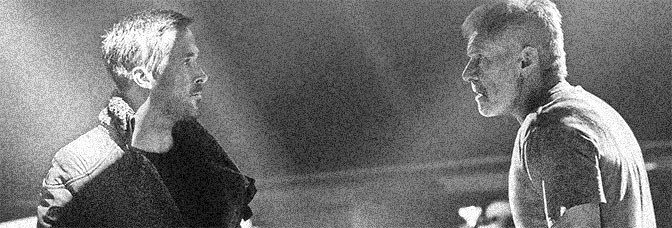Whatever its faults, Blade Runner 2049 is breathtaking. Director Villeneuve’s composition, Roger Deakins’s photography, Dennis Gassner’s production design, all the CGI–the film is constantly gorgeous. It’s got nothing beautiful to show–the world of 2049 is a wasteland, all plant life is dead, the endless L.A. skyline is (while awesome) nasty, San Diego is a huge, inhabited dump. I mean, Jared Leto is a biochem industrialist who saves the world; like that world is going to be nice.
2049 spends a lot of time showcasing the achievements of that exterior setting. Interiors are sparer. Villeneuve’s direction is always good (or better), but the interior scenes lack something visually. Joe Walker’s editing can usually cover for it. Most of the interiors have lead Ryan Gosling wishing he was a real boy instead of a pretend one. He’s even got a pretend girlfriend (Ana de Armas as a holographic companion) who wishes she was a real one.
For a while, 2049 seems like it might be about Gosling and de Armas. But it’s not. Because even though Gosling is a Blade Runner, he’s not the blade runner 2049 cares about. Once Harrison Ford shows up, even when the movie’s from Gosling’s perspective, it’s not Gosling’s movie anymore. Maybe if the film had some great part for Ford, it would matter. But it doesn’t. It gives him a few minutes to get established, in a completely different context than his previous turn in the role, and then it keeps him around. Walker’s editing doesn’t cover for Ford like it does Gosling. Gosling sits around despondent in his affectless. Ford looks surprisingly genial and well-adjusted for a person who’s supposedly lived in complete isolation for the last thirty years.
Bringing me to talking about 2049 as a sequel to the original. Because there’s really nothing to it otherwise. There are a handful of sequel setups in 2049, but the way screenwriters Hampton Fancher (returning from the first film) and Michael Green find a story from the first movie? They just retcon obtusely, trusting Villeneuve to be able to pull it off. And he does. He’s able to keep 2049’s narrative detached from the screenplay’s minutiae (for most of the film); Gosling helps, until the movie stops wanting him to help. de Armas helps. Robin Wright (as Gosling’s boss, in an underwritten, underutilized role) helps. Ford’s likable, which really isn’t enough (and might be completely inappropriate, actually). Villain Sylvia Hoeks doesn’t help. She’s shockingly underdeveloped. And Villeneuve’s direction of the genetically enhanced replicant fight scenes is wanting. He can do it when it’s inconsequential, but he’s not able to make the fights dangerous for the characters.
Possibly because of Gosling’s complete detachment in the third act of the film, which is when there’s all the “first movie” revelations (but not, rather events soon following the first movie revelations) and sequel setup. Gosling starts on a hero’s quest, then finds himself just an observer of one. The prologue to one. Villeneuve and company cover as best they can–making the narrative events as unimportant an aspect to the film as possible–but they can’t. Villeneuve can’t share the movie between Ford and Gosling, neither can the script. Everyone just throws up their hands.
Probably because Ford doesn’t need to be there. But if Ford doesn’t need to be there, maybe the direct ties to the first movie don’t need to be there; take those two things away and there’s nothing to 2049 except the gorgeous dystopia. Gosling and de Armas’s subplot, which the film ends up using mostly pragmatically, is red herring.
The music, from Benjamin Wallfisch and Hans Zimmer, is lacking. But maybe because the film uses it so sparing. 2049 is bold where it can excel–the visuals–and cowardly where it needs to create. The villains are exceptionally thin. Gosling loses his movie. Ford gets to retread a part made different to allow for a way too careful sequel.
It’s too bad, but–deep down–no one should’ve thought a Blade Runner sequel would work. Especially not with Ford forced back into it. It’s like they got the money for a sequel but no one with a real idea for one. Villeneuve’s direction is visually stunning, his direction of actors is usually strong, but he’s got no handle on the story. 2049 is about avoidance.
I mean, who wouldn’t want to avoid a future where Jared Leto saved humanity.
CREDITS
Directed by Denis Villeneuve; screenplay by Hampton Fancher and Michael Green, based on a story by Fancher, and characters created by Philip K. Dick, Fancher, and David Webb Peoples; director of photography, Roger Deakins; edited by Joe Walker; music by Benjamin Wallfisch and Hans Zimmer; production designer, Dennis Gassner; produced by Bud Yorkin, Broderick Johnson, Cynthia Sikes, and Andrew A. Kosgrove; released by Warner Bros.
Starring Ryan Gosling (K), Harrison Ford (Rick Deckard), Jared Leto (Niander Wallace), Ana de Armas (Joi), Sylvia Hoeks (Luv), Robin Wright (Madame), Dave Bautista (Sapper Morton), Mackenzie Davis (Mariette), and Carla Juri (Dr. Ana Stelline).
RELATED

Leave a Reply